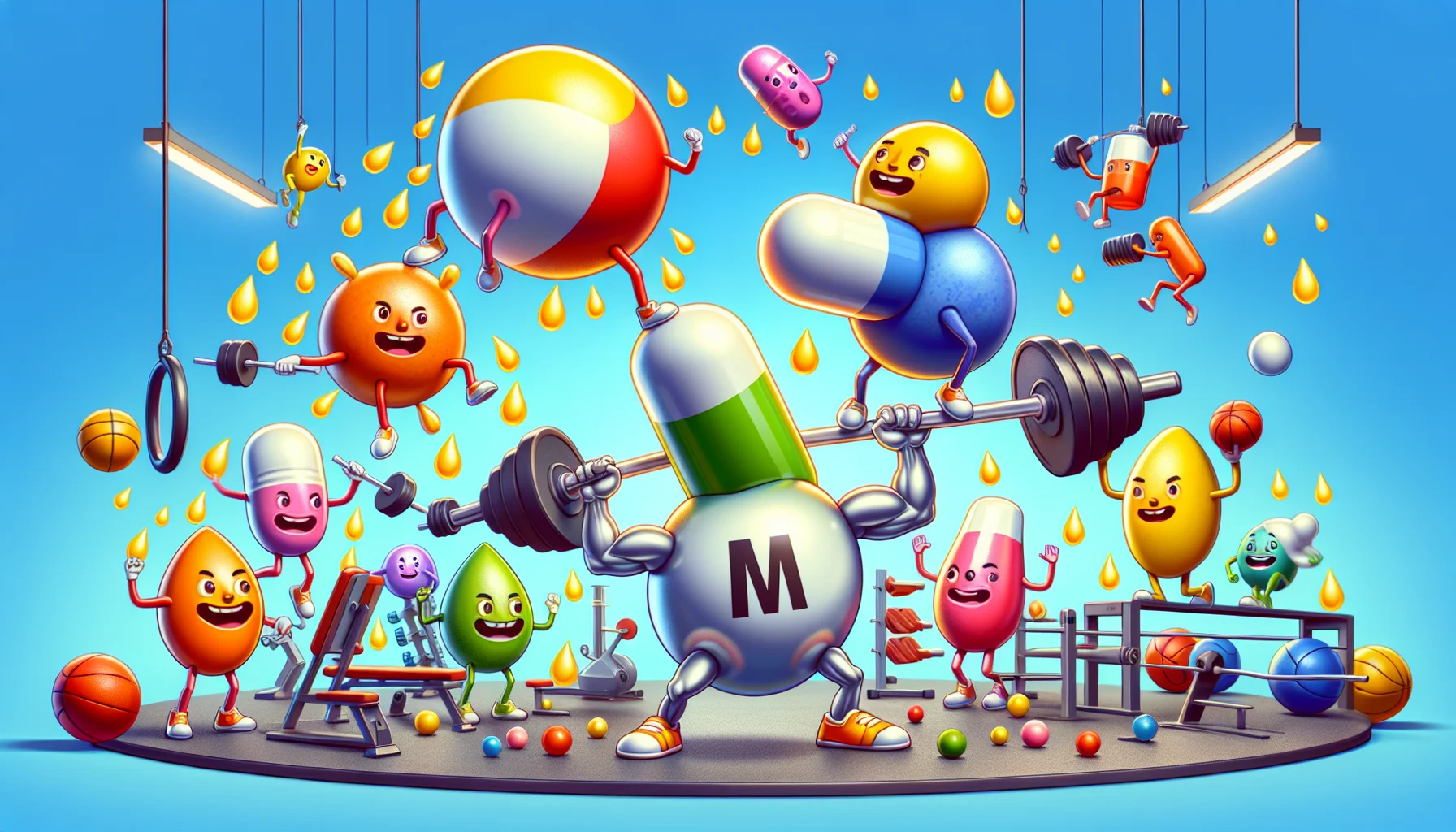Vital nutrients magnesium Quiz
Test Your Knowledge
Question of
The Essential Role of Magnesium in Sports Performance
Magnesium plays a crucial role in the performance of athletes and individuals who engage in regular physical activities. This vital mineral is involved in over 300 biochemical reactions in the body, including protein synthesis, muscle and nerve function, blood glucose control, and blood pressure regulation. It helps in the production of energy and is essential for the proper functioning of muscles, including the heart, making it particularly important for endurance and strength. Magnesium also aids in the recovery process by reducing inflammation and helping to prevent cramps and muscle soreness. Its role in maintaining electrolyte balance and preventing dehydration further underscores its importance in sports performance. Ensuring adequate magnesium intake can help enhance athletic performance, improve recovery, and reduce the risk of injury, making it a key component of any athlete's nutrition plan.
Understanding Magnesium: Types and Sources
Magnesium is a crucial mineral for the human body, involved in over 300 biochemical reactions. It's available in various supplement forms, each offering different benefits and absorption rates. The most common types include Magnesium Citrate, known for its bioavailability and beneficial effects on digestive health; Magnesium Oxide, often used for its laxative properties and to treat migraines; Magnesium Chloride, which is easily absorbed and used for detoxing; Magnesium Lactate, suitable for those with sensitive digestive systems; and Magnesium Glycinate, highly recommended for its calming effects and minimal impact on the stomach.
Natural food sources of magnesium are plentiful and include whole grains, leafy green vegetables (such as spinach and Swiss chard), nuts and seeds (especially pumpkin seeds, almonds, and cashews), legumes (like black beans and chickpeas), and even dark chocolate. Incorporating these foods into your diet can help you meet your daily magnesium needs and benefit from this essential mineral's health-promoting properties.
Magnesium's Impact on Muscle Function and Energy Production
Magnesium plays a crucial role in muscle function, energy production, and overall athletic performance. It is a vital mineral that acts as a cofactor in more than 300 enzyme systems that regulate diverse biochemical reactions in the body, including protein synthesis, muscle and nerve function, blood glucose control, and blood pressure regulation. Magnesium contributes to the conversion of glucose into energy, thus enhancing physical performance. It also helps in the synthesis of protein, which is essential for muscle repair and growth. Furthermore, magnesium is involved in the proper function of ATP, the energy currency of the cell, which is particularly important during high-intensity exercise. Adequate magnesium levels can help reduce fatigue, improve muscle function, and prevent cramps and spasms, thereby enhancing overall athletic performance.
Optimal Magnesium Intake for Athletes
The recommended daily magnesium intake for athletes and active individuals varies depending on several factors such as age, gender, and the level of physical activity. However, it is generally suggested that athletes consume a slightly higher amount of magnesium than the average adult due to increased magnesium loss through sweat and the demands of physical activity. For male athletes, the recommendation is often around 420 milligrams per day, while female athletes may require about 320 milligrams per day. This increased intake helps in maintaining optimal muscle function, supporting a healthy immune system, and improving overall performance and health.
The Connection Between Magnesium and Recovery
Magnesium plays a crucial role in the recovery process following exercise, largely due to its impact on muscle health. This essential mineral is involved in over 300 biochemical reactions in the body, including protein synthesis, muscle and nerve function, as well as energy production. After a strenuous workout, magnesium helps to alleviate muscle soreness and reduce cramping, making it easier for athletes and fitness enthusiasts to recover. It does this by aiding in the relaxation of muscles and regulating neuromuscular signals, which are vital for muscle contraction and relaxation. Furthermore, magnesium helps to balance electrolytes in the body, supporting proper hydration and muscle function. Ensuring adequate magnesium intake can significantly enhance recovery, improve performance, and reduce the risk of injury, highlighting its importance in any fitness regimen.
Incorporating Magnesium into Your Diet: Tips and Strategies
- Eat more magnesium-rich foods such as spinach, nuts, seeds, and whole grains.
- Incorporate legumes into your meals; black beans, lentils, and chickpeas are excellent sources.
- Snack on nuts and seeds, like almonds, cashews, and pumpkin seeds, which are not only high in magnesium but also portable and convenient for athletes on the go.
- Choose whole grains over refined grains; whole wheat bread, quinoa, and brown rice are good options.
- Add dark chocolate to your diet in moderation; it's a tasty source of magnesium.
- Consider magnesium supplements if your diet lacks sufficient magnesium, but consult with a healthcare professional before starting any supplementation.
- Drink plenty of water, especially if you're active, to help your body absorb magnesium more efficiently.
- For athletes, focus on post-workout meals that include magnesium-rich foods to aid in recovery and muscle function.
- Experiment with magnesium-rich smoothies; blending spinach, banana, almond milk, and a tablespoon of almond butter can make a delicious and nutritious post-workout drink.
- Be mindful of your daily calcium intake as well, since calcium can compete with magnesium for absorption. Aim for a balanced intake of both minerals.
Case Studies: Athletes and Magnesium Supplementation
| Athlete | Sport | Improvement | Health Benefit |
|---|---|---|---|
| Jane Doe | Marathon Runner | Reduced recovery time | Decreased muscle cramps |
| John Smith | Cycling | Increased endurance | Improved sleep quality |
| Alex Lee | Swimming | Enhanced muscle function | Better stress management |












